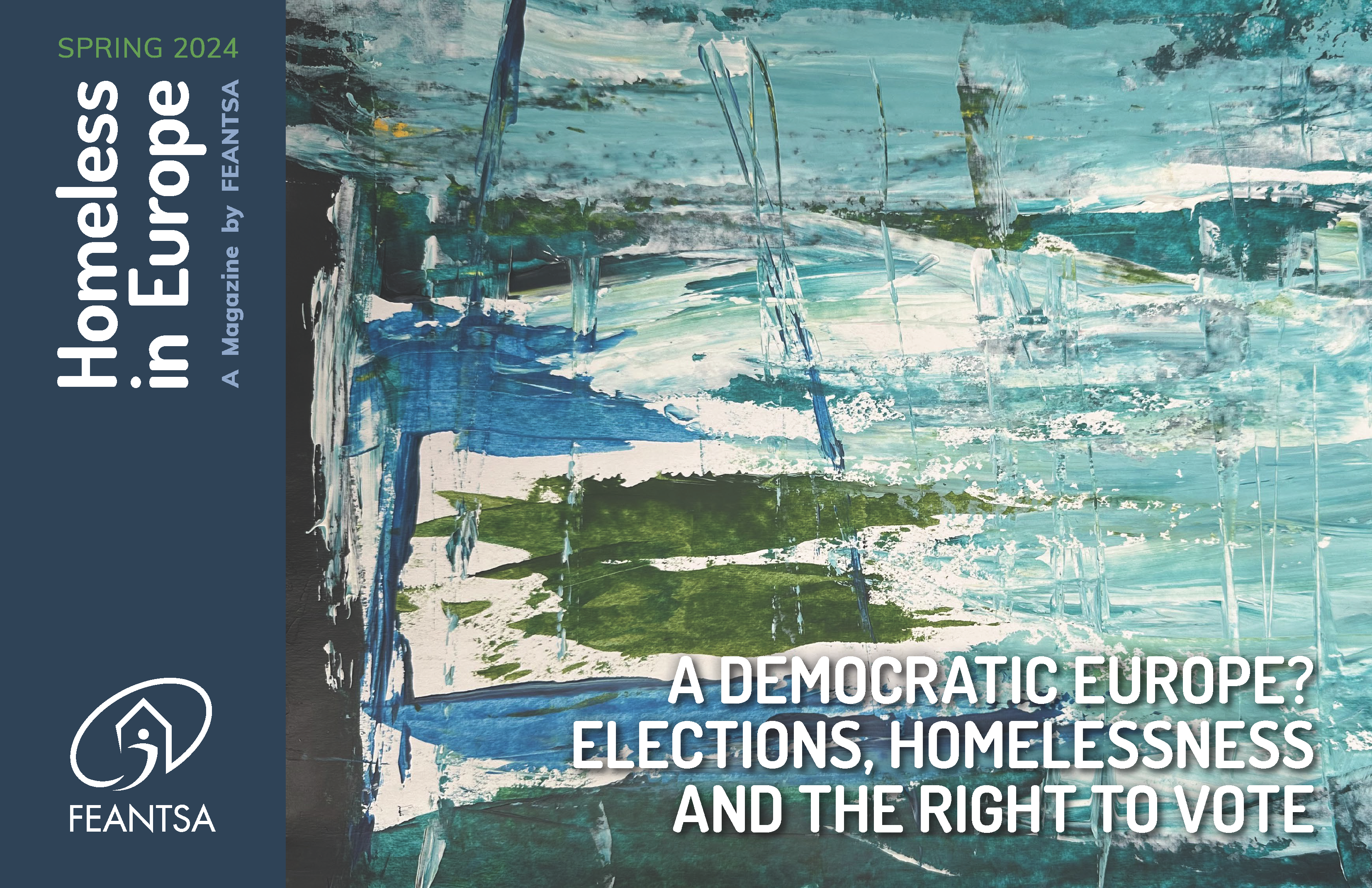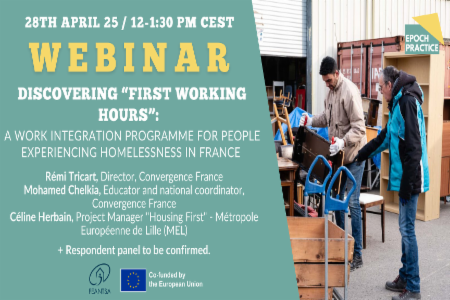
Homeless in Europe Magazine Spring 2024: A Democratic Europe? Elections, Homelessness and the Right to Vote
Read the magazine here (online PDF)
The European elections represented a key moment for FEANTSA and its members. This June 2024 the homeless sector across Europe once again confronted recurring questions: how can people experiencing homelessness exercise their right to vote? What changes are needed to ensure that voting is accessible to everyone? How can we motivate society's most disadvantaged, who frequently show distrust in the political system, to take part in elections? While these questions arise during national and local elections, it is every five years at the European level that our membership poses them simultaneously.
A central theme in this magazine is the practical and legal barriers that prevent homeless individuals from voting. These include the lack of a fixed address, language difficulties, and complex registration processes. We begin with the article by Laure-lise Robben and Koen Hermans from LUCAS KU Leuven addresses the issue of voter registration for homeless individuals without a fixed address. They explore alternative registration methods used in various European countries, arguing that an effective alternative address system must ensure that people experiencing homelessness can access both social and political rights.
In her article ‘Electoral Rights of EU Mobile Citizens Facing Homelessness,’ Claire Morotsir from ECAS outlines the obstacles EU mobile citizens encounter in voting when experiencing homelessness, such as no automatic registration and the requirement for a fixed address. She stresses that EU mobile citizens must be able to vote in their host Member States' municipal and European elections under any circumstances.
Ireland has tackled barriers to exercising the right to vote by updating its electoral legislation to improve access to the electoral register and encourage broader participation. Following this reform, Focus Ireland has launched the Voter Registration Drive Campaign. Louise Bayliss describes in her article how the campaign utilises the new legislation by introducing a fully online registration process and partnering with An Post to offer AddressPoint, a service that assigns a fixed address to those without a home. These initiatives not only make voting more accessible but also strengthen the democratic rights of marginalised communities.
While ensuring logistics enable homeless individuals to vote is important, fostering their active civic participation is equally significant. Paolo Scatola, a contributor to this magazine with lived experience of homelessness, advocates for this approach: ‘That is why homeless people must exercise their rights. They must vote for those they believe will stand up for their rights. But that's not enough. We need to be more participatory. We must be present at housing and better living conditions demonstrations. We must be heard to improve our conditions and find a way out of homelessness.’
This magazine explores additional topics within elections and homelessness, emphasising the importance of political parties incorporating homelessness into their manifestos during election campaigns, and the need for newly elected governments to prioritise it in their agendas.
In her article, Kim van de Wetering from Valente details how they executed a campaign to influence the 2023 Dutch elections by distributing a document outlining clear political objectives to support marginalised people to the main political parties. Following this, they produced various materials analysing how each party addressed those priorities, including combatting homelessness, in their manifestos. The response from the parties varied, with several incorporating Valente's recommendations into their platforms, demonstrating the campaign's tangible impact on shaping political discourse around homelessness.
Similarly, in anticipation of the next UK election, Homeless Link prepared a manifesto outlining four key priorities: everyone should have a home; all government arms should work together and contribute; the homelessness system should accommodate diverse needs, recognising that one-size-fits-all solutions do not suffice; and there should be sustained investment to prevent and permanently end homelessness, as explained in Nye Jones’ article. These demands are relevant to other national contexts in Europe or even the upcoming European election.
Nye Jones further discusses how, in its 2019 manifesto for the national elections, the Conservative Party promised to end rough sleeping in England by the end of 2024. Despite being a bold commitment that ultimately remained unfulfilled, Jones highlights its significance for the homelessness sector. It provided a critical point of accountability and a foundation for policy engagement with the government.
Shifting the focus to the European Union, a good first step after the election would be a Mission Letter for the Commissioner for Jobs and Social Rights that includes the ambition to work towards ending homelessness as a priority, in line with the Lisbon Declaration signed by all EU Member States and the EU Institutions in 2021, and to continue and build on the fantastic work on homelessness of Commissioner Nicholas Schmit. The European Platform on Combatting Homelessness (EPOCH) provides the right framework to support Member States in their efforts to tackle homelessness. If we aim to drastically reduce homelessness by 2030, making it a rare and brief event, it is crucial that the newly elected Parliament and Commission leverage EPOCH's three pillars of work – data collection and monitoring, access to EU funding and financing opportunities, and mutual learning - and provide them with the necessary resources. What happens after this election will determine if the commitments of the Lisbon Declaration will become a reality. There is a strong momentum around homelessness in the European Union. This European election can help to turn this momentum into tangible progress.
Editorial by Rocío Urías, Communications Officer, FEANTSA
Articles
Homeless and address-less? On registering a vote without being registered By Laure-lise Robben, PhD student at LUCAS and Centre for Sociological Research, KU Leuven and Koen Hermans, Assistant Professor and Project Leader at LUCAS and Centre for Sociological Research, KU Leuven
Electoral rights of EU mobile citizens facing homelessness By Claire Morotsir, EU Rights Manager, ECAS
How the next UK Government can ensure a home for everyone By Nye Jones, Campaigns Manager, Homeless Link, UK
Focus Ireland hopes new electoral reforms can support their goal to end homelessness in Ireland By Louise Bayliss, Campaign Coordinator, Focus Ireland
Communications, elections, and homelessness By Kim van de Wetering, Communications Advisor, Valente, The Netherlands
A personal reflection By Paulo Scatola, Expert by Experience, Portugal





